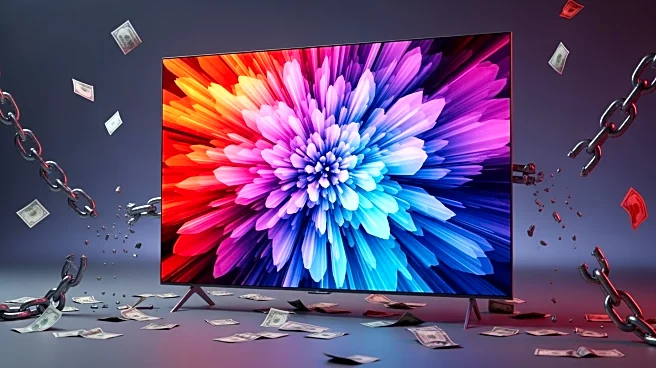What's Happening?
Disney and YouTube TV are embroiled in a carriage dispute that has resulted in Disney networks, including ABC and ESPN, going dark on YouTube TV since October 30. This blackout affects YouTube TV's 10
million subscribers, particularly impacting sports fans who are missing out on major events like Monday Night Football. Disney is reportedly losing approximately $60 million over a 14-day period due to the absence of fees from YouTube TV. The dispute arises as Disney transitions to streaming while still relying heavily on its legacy pay-TV operations. YouTube TV, owned by Alphabet, has aggressively pursued sports content, including the NFL's Sunday Ticket package, which complicates the situation for subscribers who may consider switching services.
Why It's Important?
The ongoing dispute highlights the shifting dynamics in the media industry, where traditional pay-TV providers and streaming services are increasingly at odds over content distribution. Disney's financial losses underscore the importance of carriage agreements in maintaining revenue streams from legacy operations. For YouTube TV, the blackout risks subscriber dissatisfaction, especially among sports fans who may seek alternative services. The situation reflects broader industry trends where companies are navigating the balance between traditional media and digital platforms. The outcome of this dispute could influence future negotiations and strategies for media companies as they adapt to changing consumer preferences.
What's Next?
As the dispute continues, both Disney and YouTube TV face pressure to resolve the impasse to avoid further financial losses and subscriber churn. Disney may leverage its recent acquisition of a majority stake in Fubo to bolster its streaming offerings and mitigate losses. Meanwhile, YouTube TV's offer of a $20 credit to subscribers enduring the blackout suggests efforts to retain customer loyalty. The resolution of this dispute could set precedents for future carriage negotiations, impacting how media companies structure their content distribution strategies. Stakeholders will be closely monitoring Disney's upcoming earnings report for insights into its financial health and strategic direction.
Beyond the Headlines
The dispute raises questions about the sustainability of current pay-TV models in the face of growing streaming alternatives. Disney's strategy to enhance its ESPN subscription service and its acquisition of Fubo indicate a shift towards direct-to-consumer platforms. This could lead to long-term changes in how media companies monetize content and engage with audiences. Additionally, the blackout highlights the competitive landscape among streaming services, where exclusive content and pricing strategies play crucial roles in attracting and retaining subscribers.









